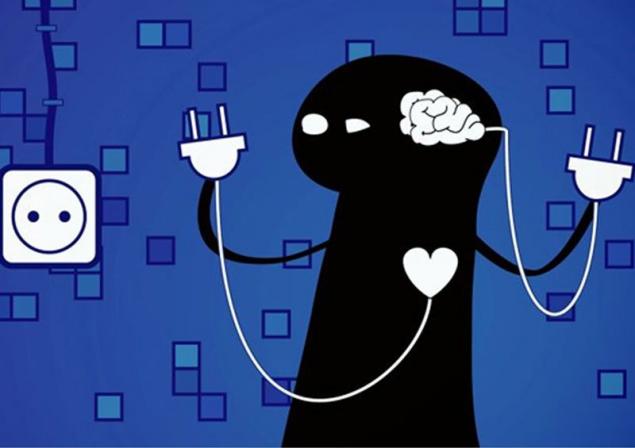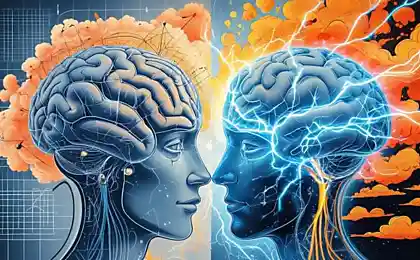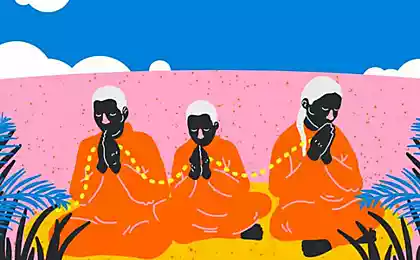833
Instant decision and 2 method of making difficult decisions
It is possible to allocate three basic ways of solving complex problems:
1. Instant decision, accept without thinking.
2. A conscious decision taken as the result of logical analysis.
3. An unconscious decision, based on the insight, the feeling of correctness.

In the management of these three types of solutions are called, respectively:
These names were proposed modern classic of management science, Henry Mintzberg.
First make
“According to the ancients, the decision must be made within seven breaths.”
Yamamoto Cuentame
Instant solutions are good in two situations: when no time to think and when to think over what.
The Japanese samurai and the modern commandos are taught to make decisions instantly. Because where they find themselves time for reflection just yet. But, as practice shows, the best way to make a decision immediately is to take it in advance.
In schools of extreme driving you are taught how to behave in non-standard situations on the road. Doing this, turning a precarious situation into a standard for you. You create a lot of extreme (but safe) situations and show you how to behave in such situations, using decades of driving wisdom. Wisdom accumulated in books, minds and muscles of people. When you find yourself in this situation actually, you already know how to behave.
The second option is when you have no information. You can't think of what to do, because you have no basis for thought. And then you just do "something". In modern management this is called "Ready, fire, aim!", ie first "fire" and then "aim". When you do "something", you get feedback. And this is the information on which to reflect.
First, I think
About this way says a huge amount of books, I will not dwell on it. This is the traditional Western method of decision-making. We think it is.
In the East they say that if thinking long, then the solution will not be good.
Saying attributed to Confucius, States that "many think not, think twice — and stop." The East has never enjoyed the popularity of visual-logical methods of thinking.
If you do not write down or sketch their thoughts, then they really crawl in different directions. And then the solution really gets bad.
But the great invention of Western civilization – the invention of logical analysis. No, we don't just "think". We take the available data and begin to sort through, draw diagrams, graphs, charts, do a SWOT analysis to compare alternatives with the desired result. I personally really cute this way and I constantly use it. At home I even have a white Board and markers for drawing. This method works well when there are information and time. A lot of time.

First see
This is the mystical method of decision-making of the three. It is called... as it is called! Insight, inspiration, intuition, vision, the unconscious, the sixth sense, second...
To illustrate the use of the Apple falling on the head of the unfortunate Newton, opening in this moment the law of gravity. It is known that the Apple on his head didn't fall – but who cares now?
Depict bulb – bearing in mind whether Edison (who did not pridumal), or just the English word illumination which means both "illumination" and "inspiration".
Sometimes depict a meditating Buddhist monk – probably thanks to the famous Zen "Satori method", "instant enlightenment".
What is this method? In Gestalt psychology (with roots Dating back to the philosophy of Schopenhauer, and from there to Eastern mysticism) is called the four stages of making intuitive decisions:
Preparation is the gathering of information, incubation is just sitting in meditation, which deals with the monk in the picture, the illumination is the light that metaphorically lights up over his head, and finally... check!
As a conscious way, it works only when there is information and time. Time for meditation a lot of it. Perhaps even indefinitely many. published
P. S. And remember, just changing your mind — together we change the world! ©
Source: www.newcode.ru/doku.php/tactics/3-ways
1. Instant decision, accept without thinking.
2. A conscious decision taken as the result of logical analysis.
3. An unconscious decision, based on the insight, the feeling of correctness.

In the management of these three types of solutions are called, respectively:
- "please do",
- "think first",
- "first, you see."
These names were proposed modern classic of management science, Henry Mintzberg.
First make
“According to the ancients, the decision must be made within seven breaths.”
Yamamoto Cuentame
Instant solutions are good in two situations: when no time to think and when to think over what.
The Japanese samurai and the modern commandos are taught to make decisions instantly. Because where they find themselves time for reflection just yet. But, as practice shows, the best way to make a decision immediately is to take it in advance.
In schools of extreme driving you are taught how to behave in non-standard situations on the road. Doing this, turning a precarious situation into a standard for you. You create a lot of extreme (but safe) situations and show you how to behave in such situations, using decades of driving wisdom. Wisdom accumulated in books, minds and muscles of people. When you find yourself in this situation actually, you already know how to behave.
The second option is when you have no information. You can't think of what to do, because you have no basis for thought. And then you just do "something". In modern management this is called "Ready, fire, aim!", ie first "fire" and then "aim". When you do "something", you get feedback. And this is the information on which to reflect.
First, I think
About this way says a huge amount of books, I will not dwell on it. This is the traditional Western method of decision-making. We think it is.
In the East they say that if thinking long, then the solution will not be good.
Saying attributed to Confucius, States that "many think not, think twice — and stop." The East has never enjoyed the popularity of visual-logical methods of thinking.
If you do not write down or sketch their thoughts, then they really crawl in different directions. And then the solution really gets bad.
But the great invention of Western civilization – the invention of logical analysis. No, we don't just "think". We take the available data and begin to sort through, draw diagrams, graphs, charts, do a SWOT analysis to compare alternatives with the desired result. I personally really cute this way and I constantly use it. At home I even have a white Board and markers for drawing. This method works well when there are information and time. A lot of time.

First see
This is the mystical method of decision-making of the three. It is called... as it is called! Insight, inspiration, intuition, vision, the unconscious, the sixth sense, second...
To illustrate the use of the Apple falling on the head of the unfortunate Newton, opening in this moment the law of gravity. It is known that the Apple on his head didn't fall – but who cares now?
Depict bulb – bearing in mind whether Edison (who did not pridumal), or just the English word illumination which means both "illumination" and "inspiration".
Sometimes depict a meditating Buddhist monk – probably thanks to the famous Zen "Satori method", "instant enlightenment".
What is this method? In Gestalt psychology (with roots Dating back to the philosophy of Schopenhauer, and from there to Eastern mysticism) is called the four stages of making intuitive decisions:
- training
- incubation,
- inspiration,
- verification.
Preparation is the gathering of information, incubation is just sitting in meditation, which deals with the monk in the picture, the illumination is the light that metaphorically lights up over his head, and finally... check!
As a conscious way, it works only when there is information and time. Time for meditation a lot of it. Perhaps even indefinitely many. published
P. S. And remember, just changing your mind — together we change the world! ©
Source: www.newcode.ru/doku.php/tactics/3-ways























